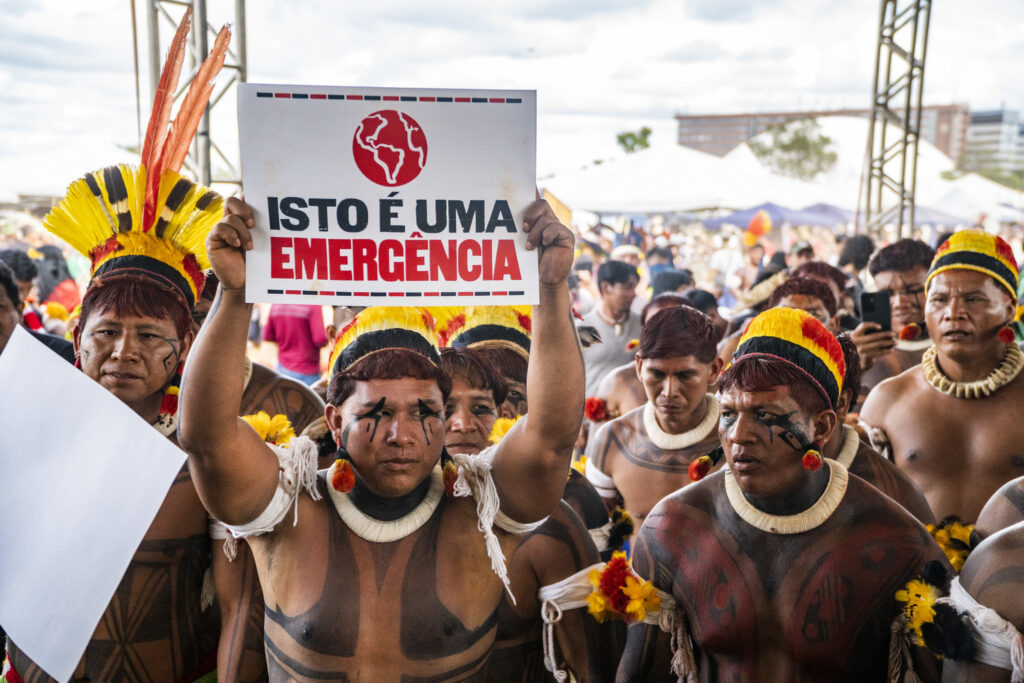An Indigenous youth holding a sign with the message “land demarcation now” during the Free Land Camp (Campamento Terra Livre) in Brasilia, April 2023. IMAGE CREDIT: Mídia NINJA
- Last week, Brazil’s Supreme Court postponed for the second time making a ruling on a case that could threaten Indigenous peoples’ territorial claims and the future of the Amazon rainforest.
- Between 1990 and 2020, Indigenous peoples’ lands or territories awaiting titling lost only 1% of their native vegetation compared with deforestation rates of 20.6% in privately owned areas.
- Titling Indigenous peoples’ lands is a cost-effective conservation mechanism that protects biodiversity within these ecosystems.
Marco Temporal–the Time Limit Thesis
This month, the Supreme Court of Brazil postponed a decision that will determine the future of Brazil’s Indigenous peoples and their territories. The ruling will have far-reaching consequences beyond Brazil’s borders, impacting biodiversity, the global climate, and possibly even the future of this planet.
“The Supreme Court must vote against the Marco Temporal because it disrespects what is written in the Federal Constitution,” says Davi Kopenawa, a shaman and political leader of the Yanomami people. “It’s not time for the time limit to emerge like a big snake to destroy us. The miners are eager for the National Congress to approve this, so they can continue to mine and bring machinery into Indigenous land. The time frame means to continue stealing the land.”
At issue is the constitutionality of what has become known as the Marco Temporal, or Time Limit Thesis.
What is the Time Limit Thesis?
This legal argument asserts that Indigenous peoples in Brazil are only entitled to lands that they legally occupied at the time of the signing of the 1988 Constitution. However, until 1988, Indigenous peoples of Brazil lived under a repressive tutorship regime which deprived them of their civil and political rights. Therefore, it is extremely difficult, and in some cases impossible, for Indigenous groups to prove their effective occupation of the land within the relevant time frame.
If the Supreme Court votes to uphold the Marco Temporal, as the thesis is called in Portuguese, their decision would set a precedent applicable to other similar cases across Brazil. Legal recourse for Indigenous communities seeking land titles would be blocked, and titled territories could be at risk, as the requirement to prove Indigenous presence in 1988 could reopen titling processes.
Indigenous groups warn this would rewrite Brazil’s history of violence and displacement and legitimize the theft of their lands. Devoid of a sound historical basis, the Marco Temporal is clearly political, and serves the interests of those who seek to restrict Indigenous peoples’ land rights in order to expand economic development in the Amazon rainforest and beyond.
Consequences of Deforestation on Indigenous Land
The Marco Temporal thesis is the greatest threat to the rights and lives of Indigenous peoples in Brazil today. But the potential impacts are not limited to these communities—they are universal.
Our shared future depends on the health of the Amazon, the world’s largest tropical forest and one of the major contributors to the climate’s maintenance. As the primary and best guardians of the Amazon rainforest, Indigenous peoples and their lands play a crucial role in mitigating climate change.

In Brazil, Indigenous peoples’ territories are the most well-preserved areas. Between 1990 and 2020, titled lands or territories awaiting titling lost only 1% of their native vegetation compared with deforestation rates of 20.6% in privately owned areas, per data from MapBiomas, a research group that monitors land-use changes with satellite imagery.
Weakening Indigenous territorial rights by enacting the Marco Temporal directly contributes to global climate change, and would have harmful long-term effects on the Amazon’s status as one of the world’s most important sinks for greenhouse gasses. For example, Indigenous peoples’ lands in the Amazon Basin contain 32.8% of the carbon stored in the forest, with 22.2% of this carbon found in lands that are not yet titled—areas more vulnerable to deforestation, which would lead to the emission of 23 gigatons of CO2 into the atmosphere.
A study by the World Resources Institute – WRI found that, because forest loss drives carbon emissions in the Amazon, climate change mitigation policies should be focused on protecting standing forests in Indigenous peoples’ territory as a way of keeping carbon emissions low.
But carbon emissions aren’t the only consequence of the degradation of Indigenous land. The Brazilian Amazon, home to 30% of the world’s species, has one of the highest rates of biodiversity on Earth. Habitat destruction, illegal hunting, and unpredictable weather threaten all life in the Amazon.
Stewards of the Amazon Rainforest
The Intergovernmental Panel on Climate Change’s (IPCC) report released earlier this year issued a “final warning” about the fate of our planet if we don’t take swift action to reduce emissions and find better ways to store carbon.
In fact, the IPCC Synthesis Report insists that the “recognition of inherent rights of Indigenous Peoples is integral to successful adaptation across forests and other ecosystems.” Without the protection of Indigenous peoples’ territories, it will be impossible for Brazil to meet the climate goals that it is committed to fulfill.
Land rights’ ambiguity in the Amazon is a serious problem, affecting almost 30% of its territory, or nearly 355 million acres. This uncertainty is one of the drivers of illegal land grabbing and deforestation, accounting for 41% of forest loss in the last decade. Additionally, land ambiguity disincentivizes sustainable investment and promotes illegal activity, according to the report “Zero Deforestation and Territorial Management: Foundations for the Sustainable Development of the Amazon.”
Land security and territorial management are necessary for the sustainable development of the Amazon. And the titling of Indigenous peoples’ lands, which increases security and reduces deforestation, is a cost-effective conservation mechanism that protects biodiversity within these critical ecosystems. It’s also an action that can be initiated quickly, in line with the urgency of addressing the climate crisis. By contrast, the Marco Temporal will create uncertainty and encourage land grabbing, which in turn promotes further destruction.
Restoring the territorial integrity of Indigenous communities is not only an ethical imperative, but also the most effective solution to the climate and biodiversity crises. Indigenous peoples are our best hope for the conservation of the Amazon rainforest.
Our Commitment to The Fight to Protect Indigenous Peoples’ Rights and Territories
Rainforest Foundation US, along with our partner organizations, have signed onto a letter to the UN Special Rapporteur on the Rights of Indigenous Peoples urging international intervention in the matter of the Marco Temporal thesis. Now, more than ever, it is crucial to express solidarity with our Indigenous partners and committ to supporting them in their fight for their ancestral lands.
Click to read our open letter to the UN Special Rapporteur on the Rights of Indigenous Peoples.








